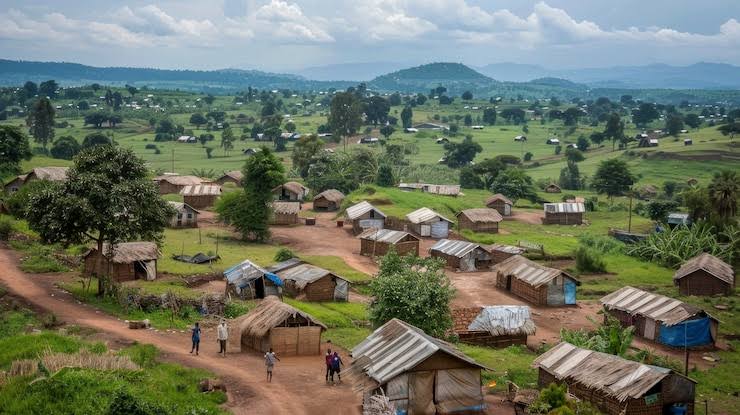As the sun dips behind Bweyale’s acacia-dotted horizon, the once-lively trading hub along Uganda’s Kampala-Gulu highway hums with unease. The streets, where traders and truckers once swapped stories over roasted maize, now carry whispers of fear. Bweyale Town, a vibrant crossroads in midwestern Uganda, is caught in a quiet storm, one fueled by a growing refugee influx from the nearby Kiryandongo Refugee Settlement. Bweyale has long welcomed strangers. Its dusty markets and open hearts have drawn Ugandan locals and refugees alike, with nearly half of its 100,000-strong population now hailing from South Sudan, the Democratic Republic of Congo, and other war-torn regions. Uganda’s open-door refugee policy, lauded worldwide, has turned this small town into a melting pot. But the weight of compassion is heavy. Rising crime, strained resources, and fraying trust are reshaping Bweyale’s spirit.“We used to sleep with our doors ajar. Now, even the chickens are locked up,” says Simon Okello, a 45-year-old father from Kasilo Cell, his voice thick with exhaustion. “Every week, it’s something new: stolen bikes, market brawls, or homes ransacked.” Simon’s words echo the numbers. Bweyale’s police post, built for a town of 20,000, now strains to serve five times that with just 28 officers. Officer in Charge ASP Harriet Namusoke reports a 34% spike in petty crimes and a 22% surge in assaults from January to June 2025 compared to last year. “Many suspects are jobless youth, some from the settlement, some local,” she says, her tone measured but weary. In Kiryandongo Refugee Settlement, Uganda’s third-largest, with over 80,000 souls, the story is different yet intertwined. Juma Mabior, a 23-year-old South Sudanese refugee, fled war only to find suspicion. “People see us as trouble,” he says, wiping sweat from his brow as he unloads sacks in Bweyale’s market. “Most of us want peace, but a few bad ones stain our name.” Aid workers like Gloria Nyangoma from UNHCR see the bigger picture. “Poverty and trauma push young refugees to the edge,” she explains. A 2025 UNHCR report notes 73% of refugee youth aged 18-30 are jobless, drifting to Bweyale’s urban sprawl in search of survival. This migration blurs lines between settlement and town, sparking competition over jobs, land, and hope. Youth, both refugee and local, are slipping into darkness. In April 2025, police nabbed members of the “K-Dogs” gang-teenagers and young men, Ugandan and refugee, behind a wave of violent robberies. Operating from Bweyale’s lawless Kasokwa and Kyankende zones, they’re a symptom of a deeper wound: idleness and despair. Hon. Florence Atuhairwe, Kiryandongo’s District Woman MP, sees the signs. “These kids feel forgotten,” she says. “Without jobs or skills, they turn to theft, drugs, or worse.”The influx has also deepened a quieter crisis: gender-based violence. Grace Acan, a community health volunteer, sees it daily in Bweyale’s bustling market. “Girls as young as 13 are trading their bodies for UGX 2,000 ($0.50),” she says, her eyes heavy with grief. Bweyale Health Centre reported 57 teenage pregnancies and 11 sexual assault cases in March 2025 alone, up 40% from the prior quarter. Cultural clashes add fuel, with differing views on marriage and gender roles sparking early unions and abuse. “We’re losing our girls,” says Annet Laker of War Child Uganda, her voice a mix of anger and resolve. Bweyale’s police are drowning. With one patrol vehicle for five cells, three markets, and a refugee reception zone, response times lag, and trust erodes. “We need more officers, cameras, anything,” pleads Hon. Peter Ogwok, the Local Council III Chairperson. Instead, residents turn to vigilante groups, risking mob justice and further chaos. Yet, amidst the strain, solutions are taking root. In May 2025, Kiryandongo’s leaders, UNHCR, and the Office of the Prime Minister formed a Refugee-Host Community Security Taskforce. It’s a start, training volunteers, offering youth skills, and mediating disputes over land and violence. At Panyadoli Primary School, a recent dialogue brought refugee and local youth together. “We’re not enemies,” says Norbert Anyama, a 17-year-old Ugandan student, his voice steady. “With training, we can protect our town together.”Bweyale’s story mirrors Uganda’s broader challenge: balancing a humanitarian legacy with the realities of integration. Experts like Prof. Samuel Abura of Gulu University warn of a breaking point. “Without investing in host towns like Bweyale schools, clinics, and jobs, insecurity will grow,” he says. As dusk settles over Bweyale’s market, children dodge welding sparks, oblivious to the tensions around them. For Simon Okello, Juma Mabior, and thousands like them, the question lingers: Can Bweyale hold its fragile peace? Uganda’s open heart has made it a beacon for refugees. But towns like Bweyale can’t bear the cost alone. Their future hinges on shared action and shared humanity.
This post was created with our nice and easy submission form. Create your post!





